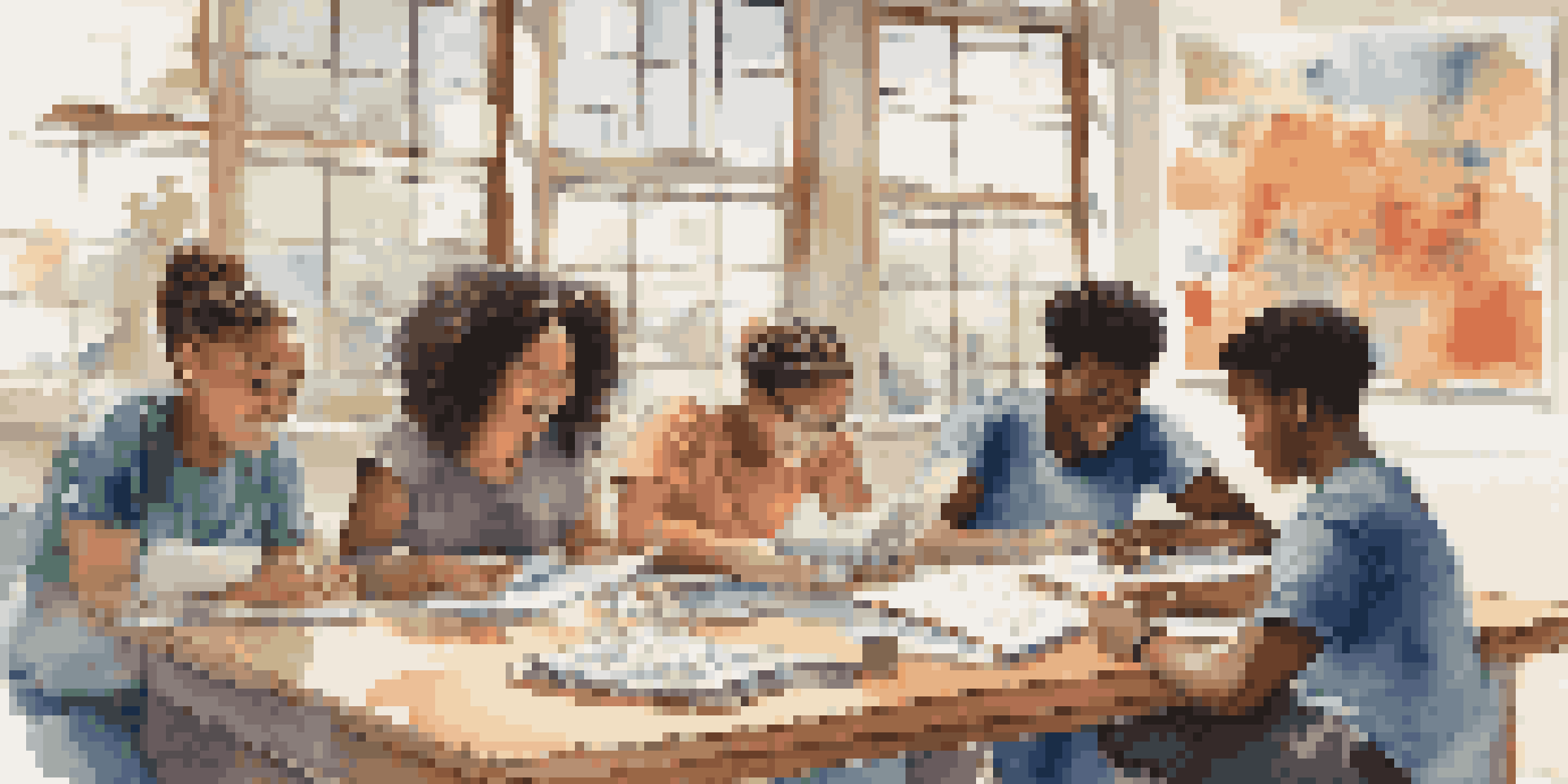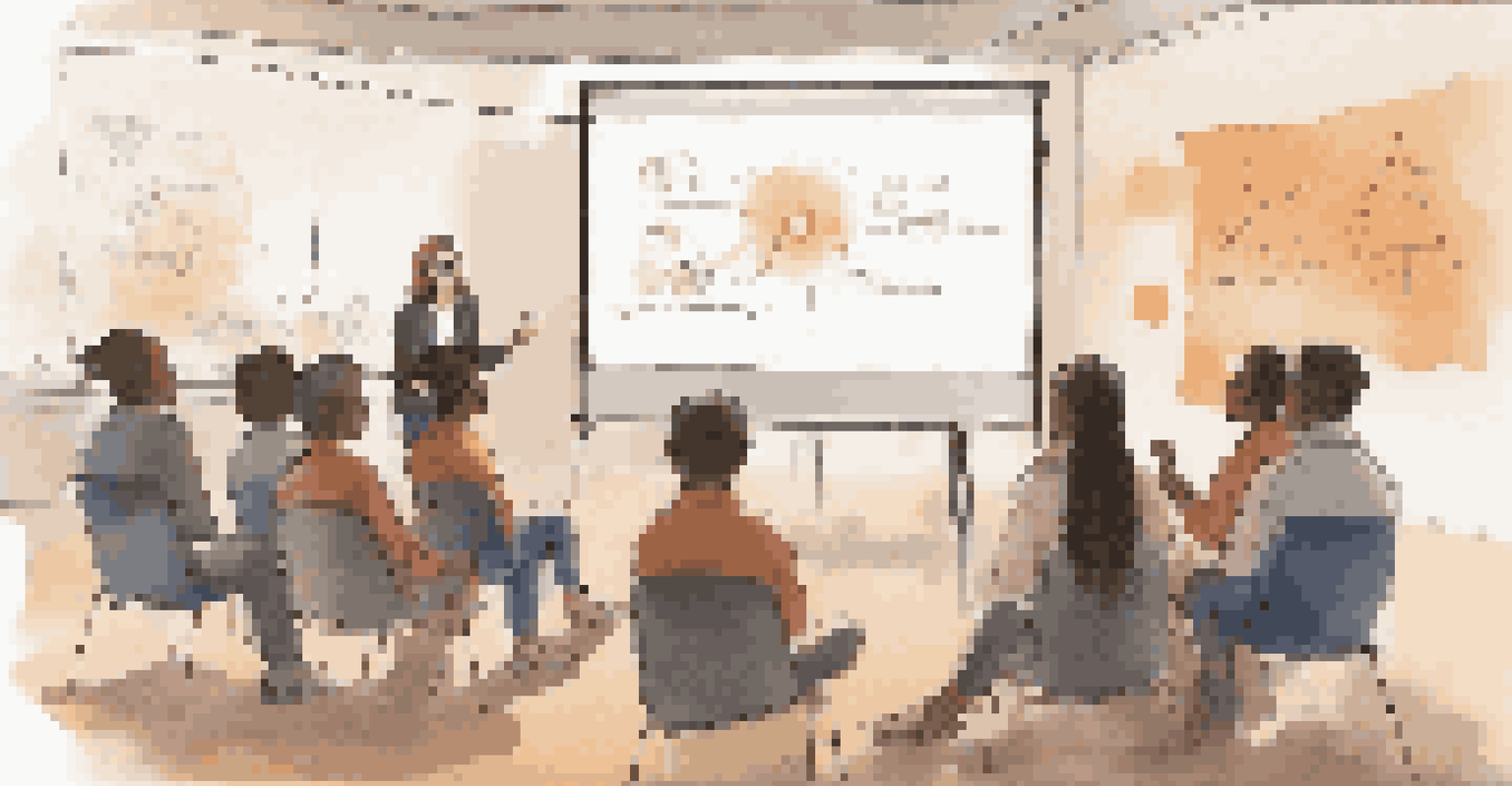Peer Learning and Its Role in Developing Media Literacy Skills

Understanding Media Literacy in Today's Digital World
Media literacy refers to the ability to access, analyze, evaluate, and create media in various forms. In our fast-paced digital environment, where information is abundant and often misleading, these skills are crucial. They empower individuals to discern credible sources from unreliable ones, promoting informed decision-making.
In the age of information, ignorance is a choice.
By developing media literacy skills, individuals can better navigate the complexities of digital content. This includes understanding biases, recognizing propaganda, and critically evaluating the messages conveyed through different media channels. As such, fostering these skills is essential for both personal and societal well-being.
Peer learning plays a vital role in enhancing media literacy, as it encourages collaboration and shared experiences. When individuals learn together, they can discuss and dissect media messages, enriching their understanding and perspectives on various issues.
The Concept of Peer Learning Explained Simply
Peer learning is a process where individuals work together to gain knowledge and skills. It can occur in various settings, from classrooms to informal groups, and it thrives on the idea that everyone has something valuable to contribute. This collaborative approach not only strengthens individual understanding but also fosters a sense of community.

In peer learning environments, learners often take on different roles, such as teacher and student, depending on their unique strengths. This dynamic exchange of knowledge enables participants to engage more deeply with the material, as they explain concepts to one another in relatable terms. It’s akin to learning how to ride a bike; sometimes, the best way to learn is by watching a friend demonstrate.
Importance of Media Literacy Skills
Media literacy empowers individuals to discern credible sources from unreliable ones, promoting informed decision-making.
Moreover, peer learning cultivates critical thinking skills. As individuals discuss and challenge each other's viewpoints, they develop the ability to analyze information more critically, an essential component of media literacy.
How Peer Learning Enhances Critical Thinking Skills
Critical thinking is the ability to analyze and evaluate information objectively. Peer learning nurtures this skill by exposing individuals to diverse perspectives and ideas. When learners engage in discussions, they are prompted to question assumptions and evaluate evidence, which is vital when consuming media.
The media is the most powerful entity on earth. They have the power to make the innocent guilty and to make the guilty innocent, and that’s power. Because they control the minds of the masses.
For instance, during a peer-led discussion on a news article, participants might examine the source's credibility, the author's intent, and the underlying biases in the reporting. This collaborative critique fosters a deeper understanding of the content and nurtures a habit of questioning rather than accepting information at face value.
Ultimately, the practice of peer learning makes critical thinking a shared experience. As learners challenge and support one another, they build a stronger foundation for analyzing media content and navigating the complexities of information.
Building Collaboration Skills Through Peer Learning
Collaboration is a key component of peer learning, and it enhances media literacy by encouraging participants to work together toward common goals. This teamwork fosters communication skills, as learners must articulate their thoughts and listen actively to others. By engaging in group projects or discussions, individuals learn to value different viewpoints.
For example, a group project analyzing various media campaigns can lead to rich discussions about messaging and impact. Each member may bring unique insights based on their experiences, leading to a more nuanced understanding of media strategies. This collaborative effort not only improves media literacy but also prepares individuals for real-world interactions.
Role of Peer Learning in Education
Peer learning enhances understanding and critical thinking by allowing individuals to collaborate and share diverse perspectives.
Moreover, collaboration in peer learning can lead to lasting relationships and networks. As individuals bond over shared learning experiences, they create support systems that extend beyond the classroom, which is invaluable for continuous growth in media literacy and beyond.
Peer Learning and Digital Literacy: A Natural Fit
Digital literacy encompasses the skills needed to effectively navigate and engage with technology. Peer learning complements digital literacy by providing opportunities for individuals to explore tools and platforms together. This collective exploration fosters confidence and competence in using digital resources critically.
For instance, a group of learners might work together to evaluate the credibility of online sources. By sharing their findings and insights, they not only enhance their digital literacy but also learn to identify which sources are trustworthy. This process builds a skill set that is increasingly necessary in today's information-rich age.
As they collaborate on digital tasks, learners also become more adept at using technology to communicate and collaborate effectively. They gain practical experience in navigating online platforms, which further strengthens their overall media literacy.
Overcoming Challenges in Media Literacy Education
While peer learning offers numerous benefits, there are challenges to consider, especially in media literacy education. Not all learners may feel comfortable participating in group discussions, which can limit the effectiveness of peer learning. It's crucial for educators and facilitators to create an inclusive environment where everyone feels valued and heard.
Additionally, varying levels of media literacy among peers can create disparities in engagement. To address this, educators can implement strategies that pair more experienced learners with those who may need additional support. This mentorship approach not only aids skill development but also reinforces the principles of peer learning.
Strategies for Effective Peer Learning
Implementing small group discussions and using real-world media examples can make peer learning more relevant and engaging.
Ultimately, acknowledging and addressing these challenges is vital for maximizing the impact of peer learning on media literacy. By fostering an environment of inclusivity and support, learners can thrive and develop the skills they need to navigate the media landscape confidently.
Practical Strategies for Implementing Peer Learning
To effectively implement peer learning in media literacy education, there are several practical strategies educators can adopt. First, establishing small group discussions can create a comfortable setting for learners to share ideas and insights. These intimate settings encourage participation and foster a sense of community.
Additionally, incorporating real-world media examples, such as recent news articles or social media posts, can make discussions more relevant and engaging. When learners analyze current content together, they can apply their media literacy skills in practical ways, reinforcing their understanding.

Finally, providing clear guidelines and objectives for peer learning activities can help keep discussions focused and productive. By setting expectations, educators can ensure that all participants stay on track and derive maximum benefit from their collaborative efforts.